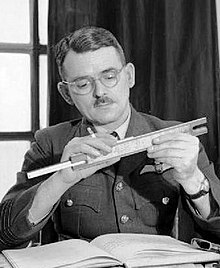
Back فرانك ويتل Arabic فرانك ويتل ARZ Frank Whittle AST Frank Whittle Czech Frank Whittle Danish Frank Whittle German Frank Whittle Spanish Frank Whittle Basque فرانک وایتل Persian Frank Whittle Finnish
Frank Whittle | |
|---|---|
 Whittle in 1943 | |
| Born | 1 June 1907 Coventry, Warwickshire, England |
| Died | 8 August 1996 (aged 89) Columbia, Maryland, US |
| Buried | Cranwell, England |
| Allegiance | United Kingdom |
| Service | Royal Air Force |
| Years of service | 1923–1948 |
| Rank | Air Commodore |
| Battles / wars | Second World War |
| Awards | Member of the Order of Merit Knight Commander of the Order of the British Empire Companion of the Order of the Bath Commander of the Legion of Merit (United States) Rumford Medal Louis E. Levy Medal Fellow of the Royal Society[1] Honorary Fellow of the Royal Aeronautical Society Charles Stark Draper Prize Prince Philip Medal |
| Spouse(s) | Dorothy Lee
(m. 1930; div. 1976)Hazel Hall (m. 1976) |
| Other work | BOAC technical advisor, Shell engineer, engineer for Bristol Aero Engines, NAVAIR Professor at the US Naval Academy |
Air Commodore Sir Frank Whittle, OM, KBE, CB, FRS, FRAeS[1] (1 June 1907 – 8 August 1996) was an English engineer, inventor and Royal Air Force (RAF) air officer. He is credited with co-creating the turbojet engine. A patent was submitted by Maxime Guillaume in 1921 for a similar invention which was technically unfeasible at the time. Whittle's jet engines were developed some years earlier than those of Germany's Hans von Ohain, who designed the first-to-fly turbojet engine as well as Austria’s Anselm Franz.
Whittle demonstrated an aptitude for engineering and an interest in flying from an early age. At first he was turned down by the RAF but, determined to join the force, he overcame his physical limitations and was accepted and sent to No. 2 School of Technical Training to join No 1 Squadron of Cranwell Aircraft Apprentices. He was taught the theory of aircraft engines and gained practical experience in the engineering workshops. His academic and practical abilities as an Aircraft Apprentice earned him a place on the officer training course at Cranwell. He excelled in his studies and became an accomplished pilot. While writing his thesis he formulated the fundamental concepts that led to the creation of the turbojet engine, taking out a patent on his design in 1930. His performance on an officers' engineering course earned him a place on a further course at Peterhouse, Cambridge, where he graduated with a First.[2][3]
Without Air Ministry support, he and two retired RAF servicemen formed Power Jets Ltd to build his engine with assistance from the firm of British Thomson-Houston.[4] Despite limited funding, a prototype was created, which first ran in 1937. Official interest was forthcoming following this success, with contracts being placed to develop further engines, but the continuing stress seriously affected Whittle's health, eventually resulting in a nervous breakdown in 1940. In 1944 when Power Jets was nationalised he again suffered a nervous breakdown, and resigned from the board in 1946.[5]
In 1948, Whittle retired from the RAF and received a knighthood. He joined BOAC as a technical advisor before working as an engineering specialist with Shell, followed by a position with Bristol Aero Engines. After emigrating to the U.S. in 1976 he accepted the position of NAVAIR Research Professor at the United States Naval Academy from 1977 to 1979. In August 1996, Whittle died of lung cancer at his home in Columbia, Maryland.[6] In 2002, Whittle was ranked number 42 in the BBC poll of the 100 Greatest Britons.[7]
- ^ a b Feilden, G. B. R.; Hawthorne, W. (1998). "Sir Frank Whittle, O.M., K.B.E.. 1 June 1907 – 9 August 1996". Biographical Memoirs of Fellows of the Royal Society. 44: 435–452. doi:10.1098/rsbm.1998.0028. S2CID 71191293.
- ^ Cite error: The named reference
telewas invoked but never defined (see the help page). - ^ "Eminent Petreans". Peterhouse Cambridge. Retrieved 20 April 2020.
- ^ Evans, R. L. "Whittle Power Jet Papers". Cambridge Digital Library. Retrieved 21 April 2017.
- ^ Cite error: The named reference
trustwas invoked but never defined (see the help page). - ^ Frank Whittle. Whittle – the Jet Pioneer. The History Channel (TV broadcast) & Quantal films (extended DVD of broadcast). Archived from the original (History Channel broadcast & DVD) on 5 March 2008. Retrieved 5 October 2007.
- ^ Wells, Matt (22 August 2002). "The 100 greatest Britons: lots of pop, not so much circumstance". The Guardian. Retrieved 20 April 2020.